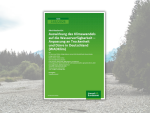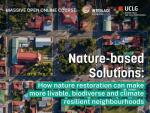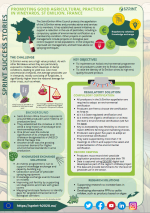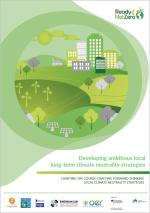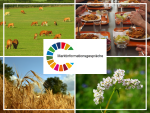Ecologic Institute Newsletter No 265 – October 2024
Climate Adaptation and Sustainable Water Management
- Ecologic Institute Newsletter
Climate Adaptation and Sustainable Water Management – New Ideas are Needed
Dear readers,
Climate change and its consequences are already being felt in Germany and throughout Europe and have a direct impact on the water balance. Our water resources are being severely strained by more frequent and more intense periods of drought. There is an urgent need to examine how we can adapt to these changing conditions in order to secure our water supply in the long term.
In recent years, the German Federal Government has developed several programs and strategies to strengthen resilience to climate change. A central aspect of these efforts is the sustainable management of our water resources, which is addressed in the National Water Strategy, the National Adaptation Strategy and the Natural Climate Protection Action Program, among others.
New, scientifically sound approaches must be developed and implemented in order to realize these environmental policy goals. Examples of such endeavors include innovative water use concepts, newly established water advisory councils and further development of measures to improve the landscape water balance.
Ecologic Institute plays a central role in the development and assessment of appropriate strategies for climate-adapted water resource management. On our website, you will find a variety of studies and presentations on climate adaptation and sustainable water management. We invite you to inform yourself about our latest research results and to actively participate in the discussion.
Information on and a link to our latest publication "Impact of Climate Change on Water Availability – Adaptation to Aridity and Drought in Germany (WADKlim)" from the UBA text series can be found directly in this newsletter.
Wishing you an inspiring read,
Dr. Ulf Stein
Coordinator Water Studies and
Jenny Tröltzsch
Coordinator Adaptation
Europe's State of Water 2024 – Report
The European Environment Agency has published the latest report on the state of Europe’s water in 2024, showing little progress in improving the ecological and chemical status of Europe's water bodies. Supported by Ecologic Institute through its coordination of the contributions from the European Topic Center for Biodiversity and Ecosystems, "The State of Water 2024" provides invaluable insights into current progress in protecting and restoring the quality and health of Europe's waters. Findings indicate that the state of Europe's water has shown little improvement since 2010, and urgent action is needed to improve Europe's water resilience in the face of increasing pressures from human activity and climate change.
Impact of Climate Change on Water Availability – Adaptation to Aridity and Drought in Germany (WADKlim) – Report
The final report of the WADKlim project outlines how climate change affects water availability in Germany and what measures are needed to meet these challenges. Through a combination of scientific literature analysis, modelling and the development of practical solutions, the report offers valuable ideas for dealing with water scarcity and water use conflicts. The implementation of further measures, such as water retention at landscape level, will be crucial to mitigating the effects of climate change in Germany.
Building Water Resilience – Policy Brief
As Europe faces increasing droughts and water shortages, it is crucial to rethink how we manage water resources to build water resilience. This policy brief highlights the key regulatory and scientific challenges related to ecological flows and water allocation, offering vital insights for policymakers and stakeholders. The authors offer critical recommendations for making water use in Europe more sustainable and emphasize the need for urgent action to combat water scarcity and climate change impacts.
Pricing Methane Emissions from the Energy Sector – Report
Stronger policies to reduce methane (CH₄) emissions from the energy sector are urgently needed. The EU Methane Regulation (EU-MER) is a great opportunity and must be thoroughly implemented. This report examines whether an EU-wide pricing mechanism should be introduced and explores feasible design options. It concludes that the EU should price CH₄ emissions from the energy sector to complement the EU-MER, providing an economic incentive to reduce methane emissions beyond the mandated level.
Nature-based Solutions: How to Regenerate Nature to Make Neighborhoods More Livable, Biodiverse, and Resilient to Climate Change – MOOC
Urban areas are facing unprecedented challenges such as pollution, climate change and urban sprawl – conventional approaches are no longer enough. Learn how nature-based solutions can make a decisive contribution to designing resilient and sustainable cities in our free online course. Specially designed for practitioners and decision-makers, the course offers practical content and resources from Ecologic Institute's INTERLACE project. In seven interactive modules with expert videos, case studies and quizzes, you will learn how to successfully implement nature-based solutions and maximize the environmental, social and economic benefits for your city. Enroll now!
Bridging Continents: Exploring the State-of-Play of Nature-Based Solutions in the EU and LAC – Report
Cooperation in research and innovation between the European Union (EU) and Latin America and the Caribbean (LAC) is gaining momentum, with nature-based solutions (NbS) emerging as a key focus. In a new independent expert report for the European Commission entitled "Bridging Continents: Exploring the State-of-Play of Nature-Based Solutions in the EU and LAC: Building a Foundation for Collaboration," Natalia Burgos and McKenna Davis from Ecologic Institute together with Daniela Rizzi offer a comprehensive analysis of NbS efforts in both regions. Drawing insights from the Ecologic-led INTERLACE project and its Urban Governance Atlas, the report highlights successful policies, funding mechanisms and local initiatives that are driving NbS across diverse ecosystems and sectors. It also outlines pathways for enhanced cooperation between the EU and LAC to scale up NbS and tackle global challenges. The report will be officially launched at COP16 in Cali (Colombia) on 21 October 2024.
New Forms of Cooperation for the Transformation of Regional Agri-food Systems – Report
How can regional agricultural and food systems be made more sustainable? This report highlights new models of cooperation that bring together farmers, consumers and civil society actors to improve access to land and strengthen regional economic cycles. A key finding is that such co-operations are not only ecologically beneficial, but also create social and economic synergies for rural regions.
SPRINT Success Stories: European Initiatives Successfully Transitioning Away from Synthetic Pesticide Reliance – Factsheets
As part of the Horizon project SPRINT (Sustainable Plant Protection Transition: A Global Health Approach), Ecologic Institute has published new factsheets highlighting four successful European case studies that transitioned away from synthetic pesticides. These showcase sustainable agricultural and institutional practices in France and Slovenia, developed in collaboration with farmers and municipalities. The factsheets offer innovative insights into pesticide reduction strategies and reflect on the challenges and potential for replicating these approaches elsewhere. This series is part of SPRINT's broader effort to promote safer, more sustainable alternatives to synthetic pesticides across the EU.
The Missing Consensus: An Analysis of Problem Definitions and Key Motivations in the First Zero Draft for a Global Plastics Treaty – Article
Plastic pollution is one of the most severe environmental crises of our time and urgently requires global solutions. This article by Doris Knoblauch and Linda Mederake critically examines the first zero draft of the proposed international treaty against plastic pollution. Their analysis shows that the draft neglects important aspects such as the entire life cycle of plastics and their impact on climate goals. The article emphasizes the need for a comprehensive, holistic strategy that takes into account both upstream and downstream measures.
The EU Carbon Removal Certification Framework – Report
With the Carbon Removal Certification Framework (CRCF), adopted in 2024, the EU established a voluntary framework for carbon removal certification, which includes criteria for the certification of removals, rules for the certification process and the recognition of certification schemes. A new report by the Ecologic Institute and the Oeko-Institut for Germany’s Federal Environment Agency (UBA) discusses options for how certified removal units may be used. The report also explores what policy options are available to complement funding for removals besides revenues generated through the CRCF.
Recommendations for the Implementation of a Sustainable and Socially Accepted Subsoil Management in Germany – Policy Brief
This policy brief presents recommendations for sustainable and socially accepted subsoil management in Germany. The Soil³ project (2015–2025) explored biological and mechanical methods to improve subsoil use, focusing on enhancing root access without damaging ecological functions. Findings highlight the potential for yield improvements, especially in areas with compacted soils or drought risk, but challenges such as high costs and regulatory uncertainties remain. Key policy recommendations include supporting alfalfa cultivation, strengthening research and clarifying legal frameworks.
Developing Ambitious Local Long-Term Climate Neutrality Strategies – Guidance
Local governments of all sizes are leading the way in Europe's effort to become the first climate-neutral continent. The required transformation is complex and unique for each city. The guide "Developing Ambitious Local Long-Term Strategies for Climate Neutrality," created as part of the Ready4NetZero project, supports small and medium-sized municipalities on their path to net-zero. It provides practical guidance on creating a long-term vision, planning concrete mitigation measures, financing and ensuring a just transition. It also suggests various transformation pathways the cities can adopt to guide the transition. The publication draws on the collective expertise of five partner organizations from across Central and Eastern Europe and addresses the specific needs of cities in Poland, Hungary, Croatia and Romania.
Ecologic Team Active at the Network Nature Annual Events in Brussels
Speech: McKenna Davis, Natalia Burgos Cuevas
On 25 and 26 September 2024, McKenna Davis and Natalia Burgos from Ecologic Institute participated in two important nature-based solutions (NbS) events taking place in Brussels, Belgium. During the NbS Task Forces Cluster Meeting on 25 September, McKenna Davis and Natalia Burgos contributed to collaborative discussions on advancing NbS, with McKenna working on a publication about the Nature Positive Economy and Natalia focusing on inclusive decision-making and co-creation around NbS planning and implementation. The following day, at the NetworkNature Annual Conference, they helped challenge misconceptions about ecosystem restoration, highlighting its critical economic and environmental benefits. Their contributions are part of ongoing efforts in the EU-funded INTERLACE and GoNaturePositive! projects, aiming to mainstream NbS and promote a nature-positive economy.
Reimagining Urban Spaces: Nature-Based Solutions for Inclusive Transformations in Europe and Latin America
The INTERLACE Final Conference, titled "Reimagining Urban Spaces: Nature-Based Solutions for Inclusive Transformations in Europe and Latin America," held in Granollers, Spain, showcased innovative approaches to urban ecosystem restoration through nature-based solutions (NbS). Over two days, nearly 100 experts, policymakers and city leaders from across Europe and Latin America discussed strategies for integrating NbS into urban planning to promote resilience, biodiversity and climate action. With keynotes, interactive workshops and a hands-on study tour, the event provided a platform for knowledge sharing and highlighted the importance of collaboration in advancing sustainable urban transformations.
Brandenburg's Organic Sector – 2024 Market Information Talks
Ecologic Institute, on behalf of the Ministry of Agriculture, Environment and Climate Protection of the State of Brandenburg (MLUK), cordially invites you to the Organic Market Information Talks 2024. From October to November, four events on organic cereals, organic niche crops, organic meat and organic value chains in community catering will offer exciting insights into current market developments, processing and marketing opportunities. Take the opportunity to expand your knowledge, network with farmers, processors, retailers, caterers and other stakeholders and initiate new collaborations along the organic value chain. Register now, we look forward to seeing you!
Ecologic Institute at CBD COP16: Driving NbS, Restoration and Biodiversity Finance
As the global community prepares for the sixteenth Conference of the Parties to the Convention on Biological Diversity (CBD COP16) in Colombia, Ecologic Institute will actively engage in promoting nature-based solutions (NbS), restoration initiatives and biodiversity finance. Ecologic Institute will contribute through expert panels, workshops and project launches, promoting collaborative solutions for climate action and biodiversity protection. A key highlight of Ecologic’s contribution is the panel session launching the report "Bridging Continents: Exploring the State-of-Play of Nature-Based Solutions in the EU and LAC," which will set the foundation for collaboration between the European Union and Latin American and Caribbean regions. In addition, Ecologic Institute provides expert insights from its previously developed Policy Brief series, offering critical information on nature restoration and biodiversity finance, supporting policymakers with practical approaches to achieve the targets of the Kunming-Montreal Global Biodiversity Framework.
5 Key Messages – 5 Minutes to Help Shape our Future – Feedback Survey
The EU-funded project GoNaturePositive! launched an open consultation on the nature-positive economy (NPE). It is important that stakeholder interests are captured. The project is calling on experts from across the Policy & Public Sector, Businesses including SME's, Nature-Based Enterprises, Finance and Investors, Environmental NGOs, Citizens and Community Groups, Research Organisations, and Standards Bodies to help shape the future.
Contents
- Publications
- Europe's State of Water 2024 – Report
- Impact of Climate Change on Water Availability – Adaptation to Aridity and Drought in Germany (WADKlim) – Report
- Building Water Resilience – Policy Brief
- Pricing Methane Emissions from the Energy Sector – Report
- Nature-based Solutions: How to Regenerate Nature to Make Neighborhoods More Livable, Biodiverse, and Resilient to Climate Change – MOOC
- Bridging Continents: Exploring the State-of-Play of Nature-Based Solutions in the EU and LAC – Report
- New Forms of Cooperation for the Transformation of Regional Agri-food Systems – Report
- SPRINT Success Stories: European Initiatives Successfully Transitioning Away from Synthetic Pesticide Reliance – Factsheets
- The Missing Consensus: An Analysis of Problem Definitions and Key Motivations in the First Zero Draft for a Global Plastics Treaty – Article
- The EU Carbon Removal Certification Framework – Report
- Recommendations for the Implementation of a Sustainable and Socially Accepted Subsoil Management in Germany – Policy Brief
- Developing Ambitious Local Long-Term Climate Neutrality Strategies – Guidance
- Recent: Presentations and Events
- Ecologic Team Active at the Network Nature Annual Events in Brussels
- Reimagining Urban Spaces: Nature-Based Solutions for Inclusive Transformations in Europe and Latin America
- Register Now!
- Brandenburg's Organic Sector – 2024 Market Information Talks
- News
- Ecologic Institute at CBD COP16: Driving NbS, Restoration and Biodiversity Finance
- 5 Key Messages – 5 Minutes to Help Shape our Future – Feedback Survey
